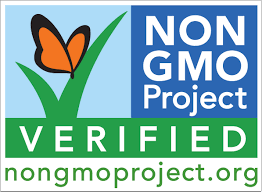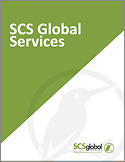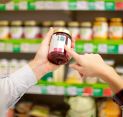
- Home /
- Services /
- Food Consumer Labels /
- Non-GMO Project Verification

Earn Recognition under Today’s Most Trusted Non-GMO Label
The Non-GMO Project Verified seal, with its distinctive Monarch Butterfly, is one of North America’s most widely recognized labels. It accounts for more than 30% of food and beverage retail sales in the US alone. In addition to food and beverage, Non-GMO Project verification applies to a wide range of products and brands in the health and beauty, cleaning, textiles, and animal products sectors. Verification satisfies consumer demand for transparency around genetically modified organisms (GMOs). It also demonstrates that your company is proactively meeting the National Bioengineered Disclosure Law by voluntarily having your product claims independently verified. Gain consumer trust, enjoy retailer preference, and reinforce brand reputation with Non-GMO Project verification.
At SCS, Our Customers Come First
Backed by more than four decades of experience in food auditing, laboratory testing, and certification, SCS is one of the most relied-upon third-party auditors in global food label claims and food safety certification. We offer competitive pricing, fast turn-around times, and expert customer service.
Take advantage of our full suite of food and agriculture certification services. Ask us how we can bundle your Non-GMO Project Verification audits with other services, such as Gluten-Free Certification, USDA Organic Certification, or Food Safety Certification for maximum cost savings and operational efficiencies.
- Program Details
- Process
- Benefits
- FAQs
Eligibility
Non-GMO Project verification applies to a wide range of consumer packaged goods (CPGs) and other products:
- Agricultural fibers
- Agricultural inputs
- Animal products
- Cleaning products, Packaging (including tea bags)
- Dietary supplements
- Fruit
- Grains
- Greens
- Health-care products
- Herbs
- Livestock feed and components
- Manufacturing and processing inputs
- Microbial starters
- Personal care products and cosmetics
- Textiles
- Vegetables
- Veterinary inputs
Non-GMO Criteria
The Non-GMO Project Standard requires you to provide evidence of practices that reduce your risk of GMO contamination from at-risk inputs and ingredients. Evaluation criteria cover:
- Traceability
- Segregation
- Risk Assessment
- Testing of high-risk inputs
- Quality Control Management
Testing
The Non-GMO Project Standard requires genetics-based testing at critical control points to be performed by an approved ISO-17025 accredited lab accredited lab to ensure compliance.
-
Request Certification
Submit initial documentation for your product(s) so that we can determine the scope of the evaluation and whether an on-site inspection will be required. We’ll then provide a quote for verification services for your approval.
-
Audit
Our technical staff collects and reviews your technical documentation and may request additional information, including testing of high-risk ingredients (if applicable). During this phase, we will determine whether your products and production practices meet the criteria of the Non-GMO Project Standard.
-
Report
We prepare a report detailing the outcome of the audit. If any nonconformities are identified, SCS can advise on corrective actions required before verification can be completed.
-
Verification
If your product meets the Standard’s criteria, you are issued a certificate of compliance valid for one year, and are permitted to use the “Non-GMO Project Verified” seal on product packaging in accordance with the Non-GMO Project licensing agreement.
-
Renewal
Annual evaluation is required to maintain Non-GMO Project Verified status.
SCS also offers a wide range of client marketing support services to interested clients.
The Non-GMO Project Verified seal is a highly trusted label that communicates adherence to industry best practices for GMO avoidance. Verification enables you to:
- Reinforce brand reputation
- Satisfy retailer customer specifications for non-GMO products
- Build consumer confidence and loyalty
- Identify practices to manage risks
- Increased profitability potential
What is Non-GMO Project Verified?
The Non-GMO Project Standard and verification program were developed through a multi-stakeholder process involving scientists, retailers, producers and other stakeholders. "Non-GMO Project Verified" is an independent, third-party certification confirming that a product has met the Non-GMO Project standard, meaning it does not contain genetically modified organisms (GMOs). Participants may enroll wholesale goods and retail consumer goods as Products for evaluation against, and determination of compliance with, the Non-GMO Project Standard. This verification process includes rigorous testing, traceability and segregation requirements, and annual auditing to ensure compliance with the Non-GMO Project Standard.Does becoming Non-GMO Project Verified require testing of every finished product?
Testing finished product is not a reliably accurate measure of GMO presence. Therefore, the Non-GMO Project Standard requires testing of individual ingredients, not products. The Non-GMO Project verification program is designed to employ testing as a best practice at the most efficient point in the production chain. Typically, this is where ingredients are least processed and consolidated in the largest amounts, for example, during initial processing. From there, traceability and segregation ensure that the tested ingredient maintains its non-GMO status.Why should I get Non-GMO Project Verified if my products are already certified as USDA Organic?
The Non-GMO Project fully complements the USDA National Organic Program guidelines for traceability and segregation and builds off of the work that certified organic companies are already doing, with the added measure of ongoing testing of high-risk ingredients at critical control points.What crops are considered at “high-risk” for being genetically modified?
Alfalfa, apple, canola, corn (except popcorn), cotton, eggplant, papaya, pineapple, potato, soy, sugar beets, zucchini and yellow summer squash, and any derivatives of these crops are considered to carry a high risk of being genetically modified because GM varieties are in large-scale commercial production.Can I still qualify if my products contain animal products such as meat, eggs, dairy, or honey?
Animal products are considered high-risk ingredients primarily because of GMOs in the animal feed. If the animal feed contains high-risk ingredients such as corn or soy, testing is required to show that those ingredients meet the Non-GMO Project Standard. The feed does not need to be Non-GMO Project Verified, as long as it meets the Non-GMO Project testing requirements (though using already verified feed expedites the verification process).Are non-food categories eligible for Non-GMO Project Verification?
Yes! Vitamins and supplements, over the counter drugs and homeopathic remedies, personal care products, pet products, animal feed, clothing, and more are all eligible for Non-GMO Project verificaiton.How much does Non-GMO Project verification cost?
The cost of verification is dependent on a few factors including the number of products, facilities, and high-risk ingredients. Contact us today for a free price quote!How long does Non-GMO Project verification take?
SCS prides itself on delivering rapid, high-quality service, so that you can meet market expectations. A verification from start-to-finish typically takes 4-8 weeks but is heavily dependent on getting the required documentation from your supply chain and production facilities.
Service Brochure











